I Think Its Funny We Live in an Era
The "we live in a society" meme is part of an internet culture of unapologetic absurdity which only makes sense from the inside looking out.
The "we live in a society" meme that you may (or TBH, may not have) seen floating across timelines and comment sections of the web has such a convoluted history that, 30 years from now, we'll probably be seeing the meme dissected in textbooks as the pinnacle of 2015-2020 internet ethos.
The internet has a habit of folding in on itself. And as online humour grows increasingly nuanced and bizarre, it can be difficult for mere mortals to detangle it in order to understand. With stereotypes that are incubated in the depths of the web and un-clocked in the analogue world, it can make looking at one meme an internet history lesson in itself. So, for today's lesson, here's everything you need to know about the "we live in a society" meme.
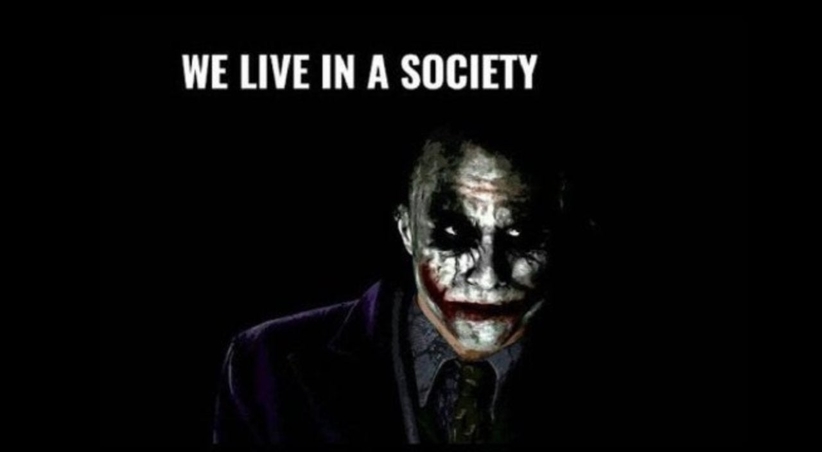
What is the "we live in a society" meme?
Typically, the "we live in a society" meme is connected to the Joker, either featuring the character himself or editing other people to look like the green-haired, red-lipped man.
If you aren't aware of this meme – or have just come to accept you probably aren't deep enough into the internet to get it – don't worry, that's the entire point of its appeal… an "I don't get it meme",if you will.
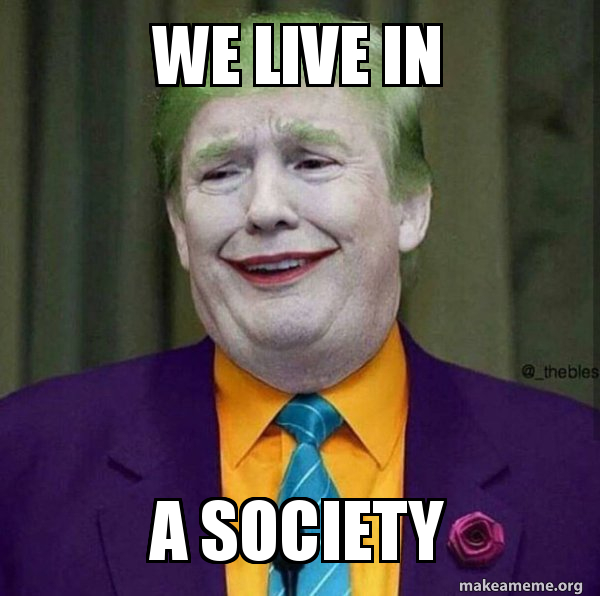
The meme is filed under the absurdist meme genre, a flavour of memes that, from the outside, are totally nonsensical unless you have a strong and oddly specific back catalogue of internet acuity.
It's similar to the 'society if meme', 'did you know meme' or the 'they live meme', which also uses absurdist humour to unpack existential angst by speculating about 'society', if things were changed.
millennial and zoomer humour is a lot of meme-style jokes – absurdist and dadaist style stuff and also a lot of jokes about mental health and nihilism.
— DoktorDare ~Depressive Demon Nightmare Enby~ (@DaringEmber) October 24, 2020
So where does"we live in a society"meme come from? The earliest trace of its origins can be found on Hong Kong-based meme site 9gag in April 2015. This is in the form of an image macro of the Joker, accompanied by the caption:"When the nice guy loses his patiance(sic) / the devil shivers."
This particular meme struck gold for a few reasons. Firstly, the whole"nice guys finish last" gamer/incel superiority complex has long been a running joke in the commentary of 9gag. Similar to the 'get a load of this society' meme, the meme is stopped in nerdily-tinted misogyny that's commonplace in brocialist circles.
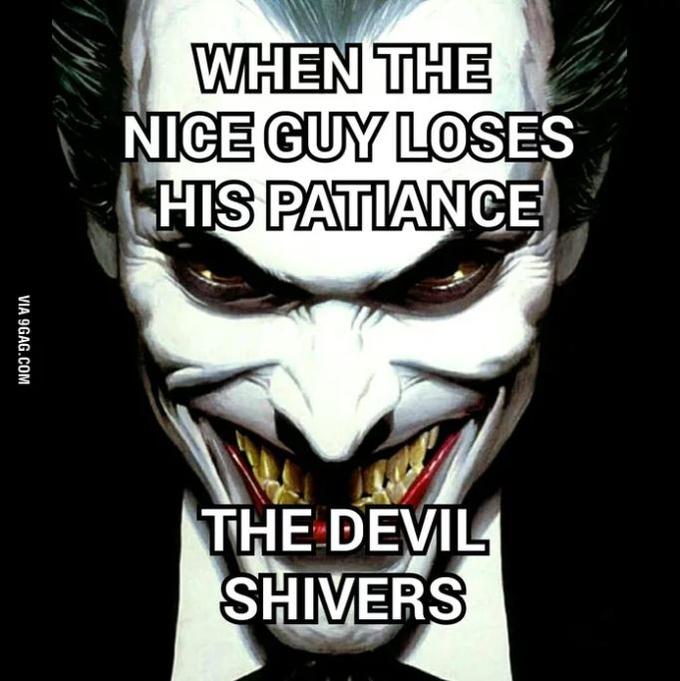
This meme is just pure sardonicism: channelling the Joker to symbolise a higher than average IQ, and then misspelling "patience".The joke wrote itself. As of a couple of months ago, the meme had garnered upwards of 38,600 points and 520 comments on 9gag, with much of the engagement boosted by ironic trolls wanting to make sure this meme became the absolute epitome of the meme site.
The DC supervillain has long been connected to the gamer identity, and following the release of The Dark Knight in 2008, it became a sort of figurehead for an entire incel community.
We live in a society where an educated man marries an uneducated women but an educated woman doesn't marry an undeucated man 👍
— ع .🦅 (@Bil_Bichur) October 20, 2020
Its constituents worshipped the Joker, believing they too embodied the misunderstood, highly intelligent social outcast, driven to villainy by the amorality of society. In a world where it's impossible to compete, the nice girls chase after hot guys and neckbeards are left without girlfriends. Yet rather than society excluding them, it was they who refused to be a part of society.
"Trump 2020!"
*10k insults and even death threats*"I bought an entire house just by exploiting my body!*
*10k likes and thousands of comments complimenting her courage*We live in a society pic.twitter.com/PDPBoFRwZH
— Mr Tboy (@MTboii3) October 1, 2020
Yet as the meme trickled into other online spaces, the line "we live in a society" – originally intended to be an enlightened statement which denounced the many flaws and contradictions of society – instead turned into a piece of satire.
Users on sites like 4chan, Reddit, and shitposting groups on Facebook poked fun at the 'woke' sentiment of the original meme, and cropping most of the accompanying text, they reposted it with the succinct catchphrase. Eventually, it even shed its "we live in a society" quotation, and can now appear as various forms of the original, such as: "get a load of this society."
Everything happens so much. Because we live in a society pic.twitter.com/ZAjlL9EJh5
— Theo Kardasis (@theokardasis) July 30, 2019
In this way, if you think about it, the meme represents an echo chamber of ridicule, in which two facets of society are continually taking aim at each other.
Did Seinfeld predict the "we live in a society" meme?
On May 23, 1991, the NBC first aired The Chinese Restaurant,the eleventh episode of a failing second season of Seinfeld. The episode sees the three characters – Jerry Seinfeld, Elaine Benes, and George Costanza – waiting for a table at a Chinese restaurant. That's it. That's the entire plot of the 23-minute episode. The audience watches in real-time as the characters simply wait.
The episode eventually ends with the characters leaving before getting a table because they no longer want to stand around. Today, it's remembered as one of the greatest and most exemplary episodes of the radical, revolutionary '90s sitcom.
"The Chinese Restaurant" episode of "Seinfeld" is one of the most perfect pieces of comedy television writing ever . . .
— Jared C. Wilson (@jaredcwilson) August 1, 2014
When the second season of Seinfeld aired, it was to predominantly disinterested spectators. Episodes were met with lukewarm audience response, a bewildered network, and dwindling ratings. Unlike its contemporaries, Seinfeld pulled humour out of the most mundane of activities and interactions. It didn't make up elaborate conflicts or climaxes. Instead, it proudly garnered a tagline as "The show about nothing."
26 years later, the Chinese Restaurant episode of Seinfeld still enrages me.
— Jon Acuff (@JonAcuff) June 24, 2017
In the end, Seinfeld went on to air for another six seasons, generate an audience of 76 million, and rack up $3 billion in returns. Today, running gags like "yada yada yada", "master of his domain", and "no soup for you", still thrive in the current 21st-century cultural zeitgeist.
Yet, outside mainstream popular culture, Seinfeld remains prophet to the surrealist memescape of 4chan and Reddit, having predicted the trends of recontextualising quips and subversion of genre, as well as a distinct departure from elitist forms of media and traditional storytelling. In that way, the show about nothing would go on to set the precedent for everything.
It goes without saying that popular culture is distributed and consumed in a very different fashion today versus the 1990s. Seinfeld seemed to initially trip-up at a time when sitcoms like Full House, Married… With Children, and of course network frenemy, Friends, were situated in a landscape that was still riding the sitcom wave of the '70s: creating plots from the same rules of relatable and accessible post-war television, with familiar characters in familiar scenarios created for a casual weekly viewership.
Seinfeld, on the other hand, was a sitcom meant for a binging era. With characters continually smirking nods to past jokes, it rewarded viewers for sticking with the sinking ship. Creator Larry David had one golden rule for the Seinfeld writers: "no hugging, no learning." It pushed boundaries, always keen to test audiences with controversial story arcs like trying to abstain from masturbation – or the meta episode arc in the fourth season where Jerry and George pitch their lives as a sitcom on the NBC. It was a show for its cult following and it didn't try or want to appeal to the masses.
Platforms like TikTok, 4chan, and Reddit thrive off this same exclusive community consciousness and, like Seinfeld, it can be difficult to penetrate them from the outside. Think of the different 'sides' of TikTok – basically the idea that the algorithm funnels users into different subsets of TikTok content, and liking particular clips will see your timeline inundated with similar posts.
Once creators discovered this is how the app curated the 'For You' page, they purposely played on this idea by creating an absurdist bean genre of TikTok (which was basically nonsensical 15-second edits of beans from a can), or the Jason Daniel Earles side of TikTok (which saw clips dedicated to the appreciation of the 43-year-old on-screen brother of Miley Cyrus in the since finished Disney Original series, Hannah Montana).
There was a thrill in seeing if you could make it into the niche community, and knowing that your contribution could mean that these nonsensical TikToks could make it onto an unassuming user's timeline. Isolated and without context, these edits are not particularly witty. But when it exists within a cultural consciousness where everyone except those on the outside gets the joke, there is humour in its unapologetic absurdity.
We live in a society
-Jesus somewhere in the bible— Henry #Henry2020 (@HenryDaWhiteboy) October 16, 2020
It can be difficult to deconstruct the surrealist meme genre, much like how it's difficult for an audience to resonate with an episode about waiting and leaving a Chinese restaurant. Both are aware of their irrelevance, and both soak in it.
"THE CHINESE RESTAURANT" (Seinfeld S02E11) "holds up nearly three decades on, even though it falls under the perennial designation of Seinfeld episodes" that could have just been solved with a cell phone. pic.twitter.com/or8dg8RW9D
— Paste Magazine (@PasteMagazine) May 11, 2020
While somewhat disputed, it is thought that the phrase "we live in a society" was chosen due to the aforementioned The Chinese Restaurant episode of Seinfeld, where George channels his own hyper-macho superiority complex to sanctimoniously discuss the injustices of the episode's payphone politics, and ultimately, the wrongs of the world. Seething, with clenched fists, he yells: "We're living in a society!"
Still angry, Costanza goes on a rant, not unlike the incel gamers on 9gag – "Does anyone ever display the slightest sensitivity to the problems of a fellow individual? No!" – only to immediately double back and change his tone when the stranger apologises for their extended use of the payphone. Immediately, George snaps out of this edge-lord fantasy and back into his wimpy character, no way being this macho man he made himself out to be.
(i still immediately twig it as a Seinfeld quote, "the Chinese Restaurant" was too ftw)
— egirl stravinsky (@wolicyponk) October 27, 2020
While it's arguable that this clip is just a coincidence and unrelated to the true origins of the "we live in a society" and "society if" meme, it is certain that Seinfeld polished the tools of the trade that we see within the 4chan and Reddit memescapes. These memes, fuelled by irony and subversion of the form, are not dissimilar to how Seinfeld took the sitcom and made a joke out of it, forcing the audience to wait 23 minutes for a table to become available at a Chinese restaurant.
we actually lived in a society before Seinfeld
— THI5 RY YA HOE MI55IN (@BigMusclesHaver) September 5, 2019
Seinfeld, much like absurdist memes, never tries to act like it has the answers or holds some greater meaning. In fact, Seinfeld actively opposed this sentiment. It never tries to be about more than whatever is happening to its characters at any given moment, just like the humble "we live in a society" meme.
If we can take away anything from this, it's that only one thing is for certain. There is a society…and we live in it.
Chillin in a Chinese restaurant and overhead a man literally say "We live in a society" unironically in a conversation. The memes are converging. The end is neigh.
— Logan Raper (@AHorseNamedDude) July 19, 2018
Wait up, did Zack Snyder really put this meme into Justice League?!
Yes, and the internet went crazy. After the dramatic music, intense narrative, and rapid action-shots, came a voice. Jared Leto's voice, to be precise. Leaning on a car, staring at the cityscape, he philosophises with Batman (Ben Affleck). "We live in a society… where honour is a distant memory. Isn't that right… Batman?". Holy-fucking-shit, they actually did it. Take a look at it below:
Does Snyder including the meme in his cut ofThe Justice League excuse his abhorrent mess known as Batman v Superman? You be the judge. Anyway, we're totally stoked that he included the quip. Even if it was only a complete troll. It really proves the growing influence of meme culture and the power of virality.
Zack Snyder making Joker say we live in a society pic.twitter.com/bZkjqY4X3V
— Dr Jake Fishbowl ✨ (@_shannon93) February 14, 2021
To celebrate, these are our top 10 " we live in a society" memes
10. Ah, the shame!
There's something about a Saturday night that screams, call your mates, get piss-drunk, then arrive home ridiculously late. For some, it means Call of Duty, Mountain Dew, and self-loathing.

9. Shoutout to Joaquin Phoenix for a second
But seriously, Phoenix's performance was one of the most harrowing things you'll see in a while. And yeah, this is the frame where he utters those infamous words.
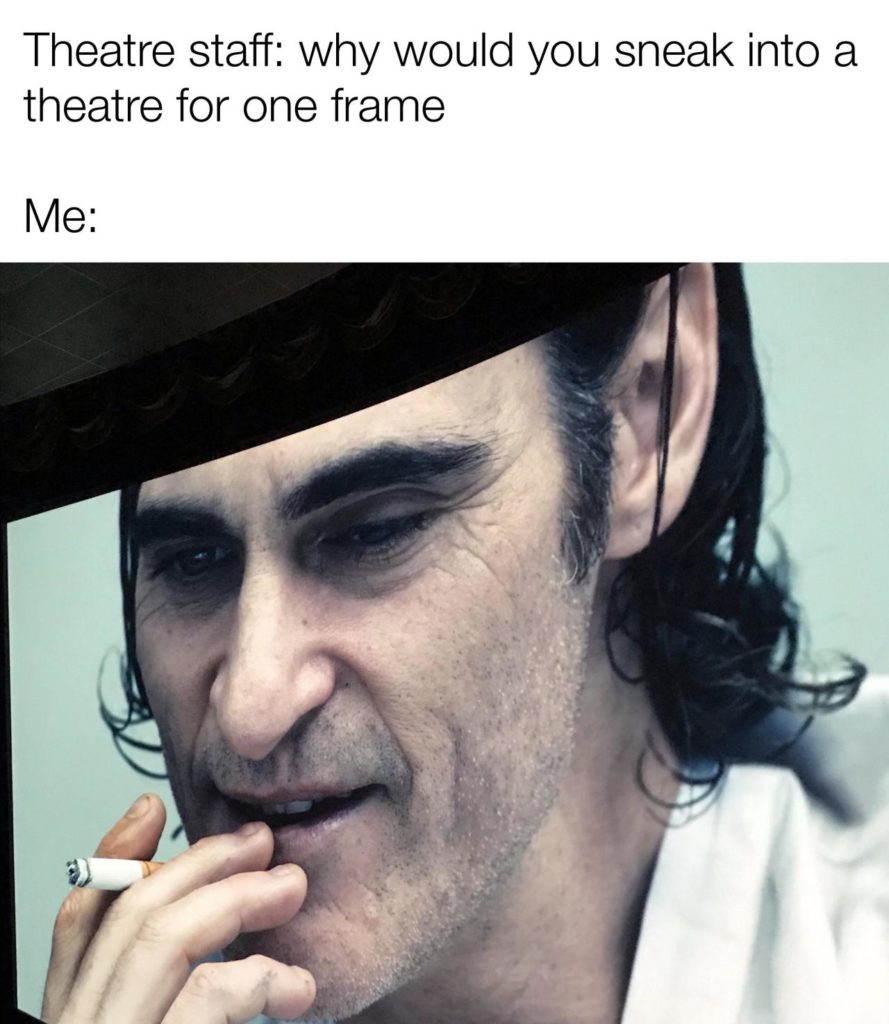
8. "Isolation can put a gun in your hand" – Unknown Mortal Orchestra
This meme was sponsored by the person at the back of the classroom with jet black hair, poor social skills, and a really murky internet search history.
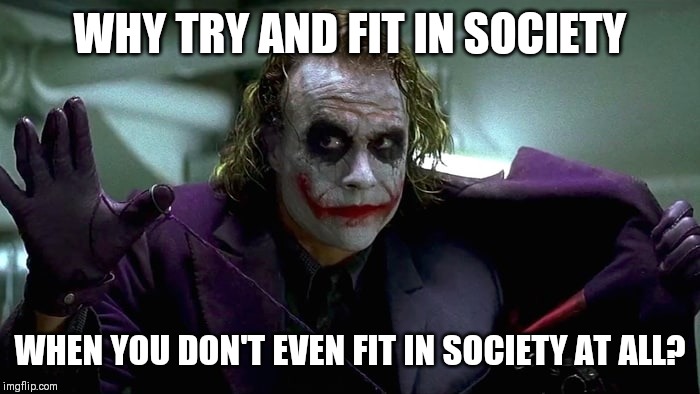
7. Excuses, excuses, excuses
What's better than taking personal responsibility for your shortcomings? Blaming society, of course.
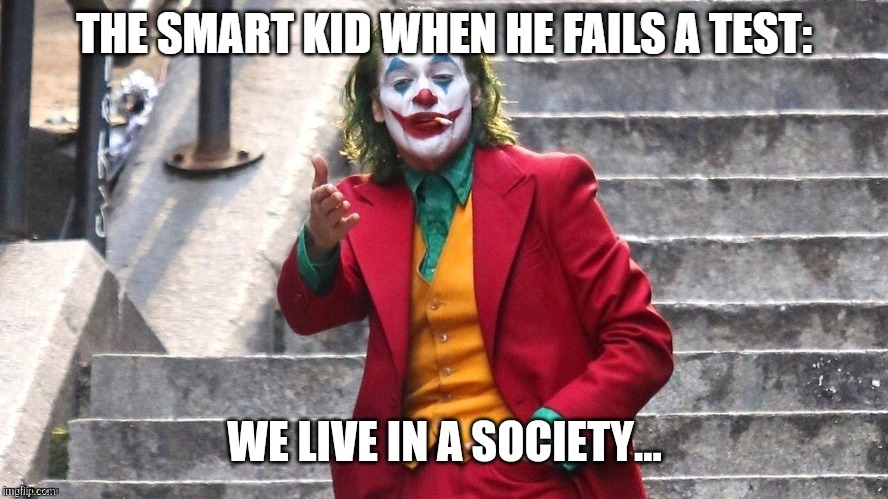
6. I'd rather not say
What's that? You haven't seen theJoker? Oh…. shame. Don't worry about this meme. It requires a high IQ to properly understand anyway. *lights cigarette*
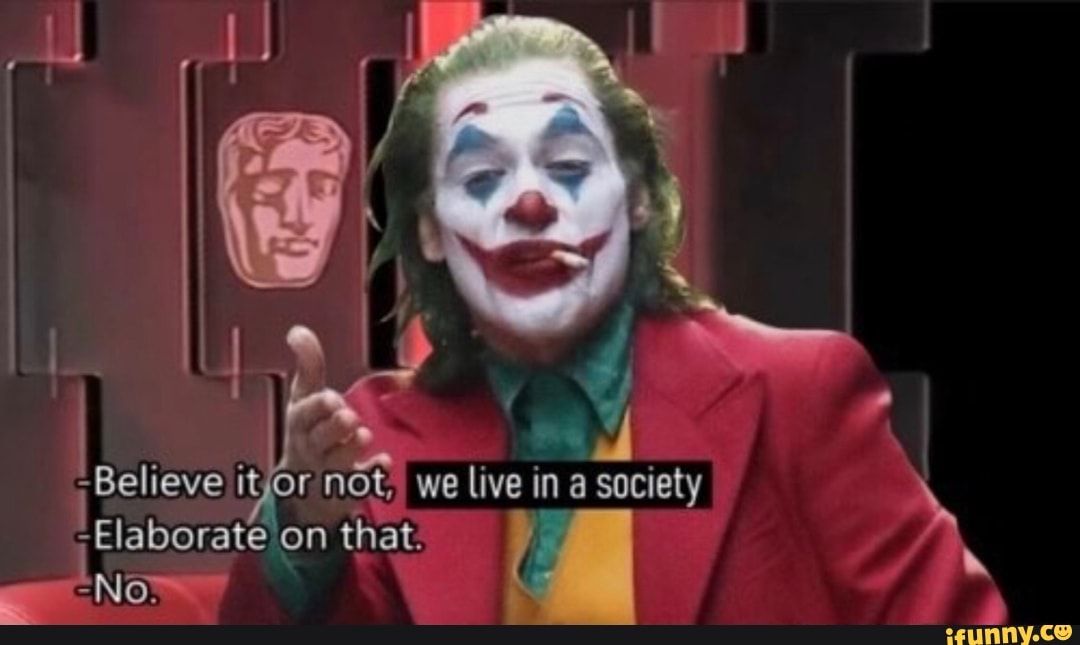
5. Edgy and political
They even brought out the late, great, Heath Ledger Joker for this one. The message here is ambiguous to me, but sometimes, that's the most effective means of sending a message.
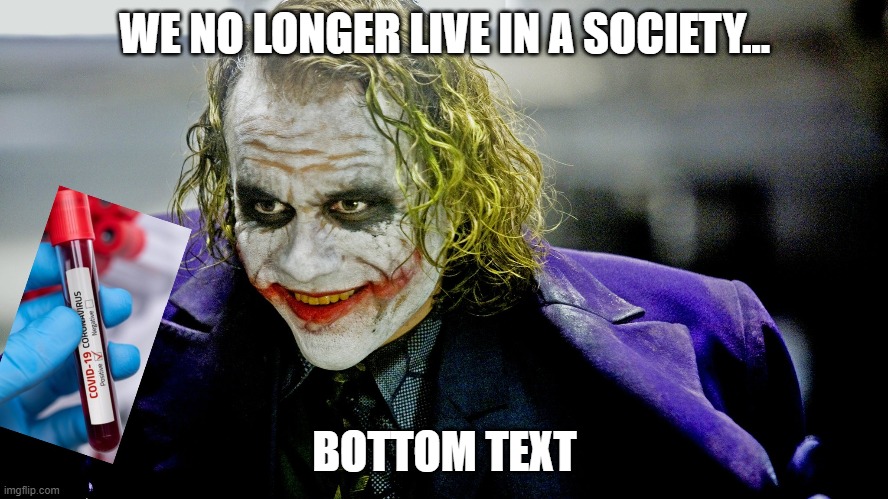
4. No going back now
Okay, I may have some bias towards the "scientist myself" meme, but this one is still right on the money. After seeingJoker (2019) and walking out of the cinemas, did you or did you not have a more cynical worldview? I thought so.
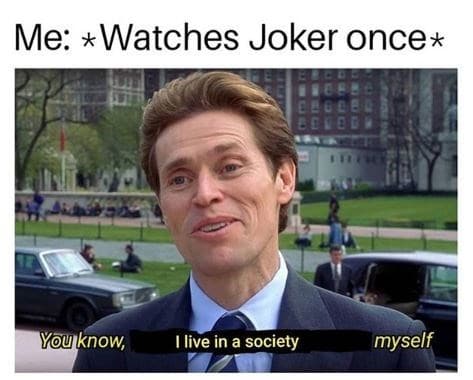
3. Okay, Boomer
You know we had to throw a little shade on the Karens of the world. Nothing gets a boomer more riled up than a younger fellow staring at a device for longer than approximately 0.001 of a second.
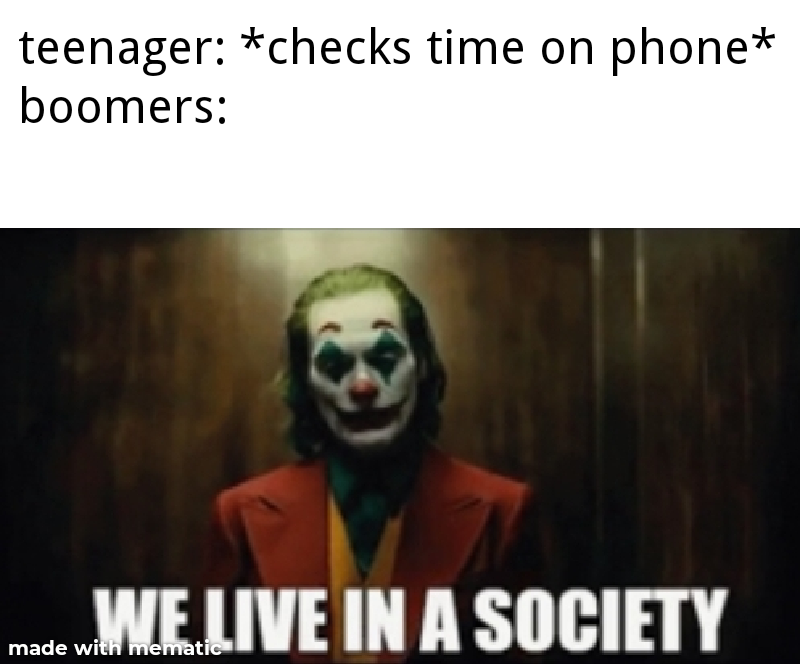
2. For the times, they are-a-changing
Without sounding too much like an English teacher, the shift from modernism to postmodernism affected everything – especially how we like our entertainment. Question everything, from yourself to society as a whole.
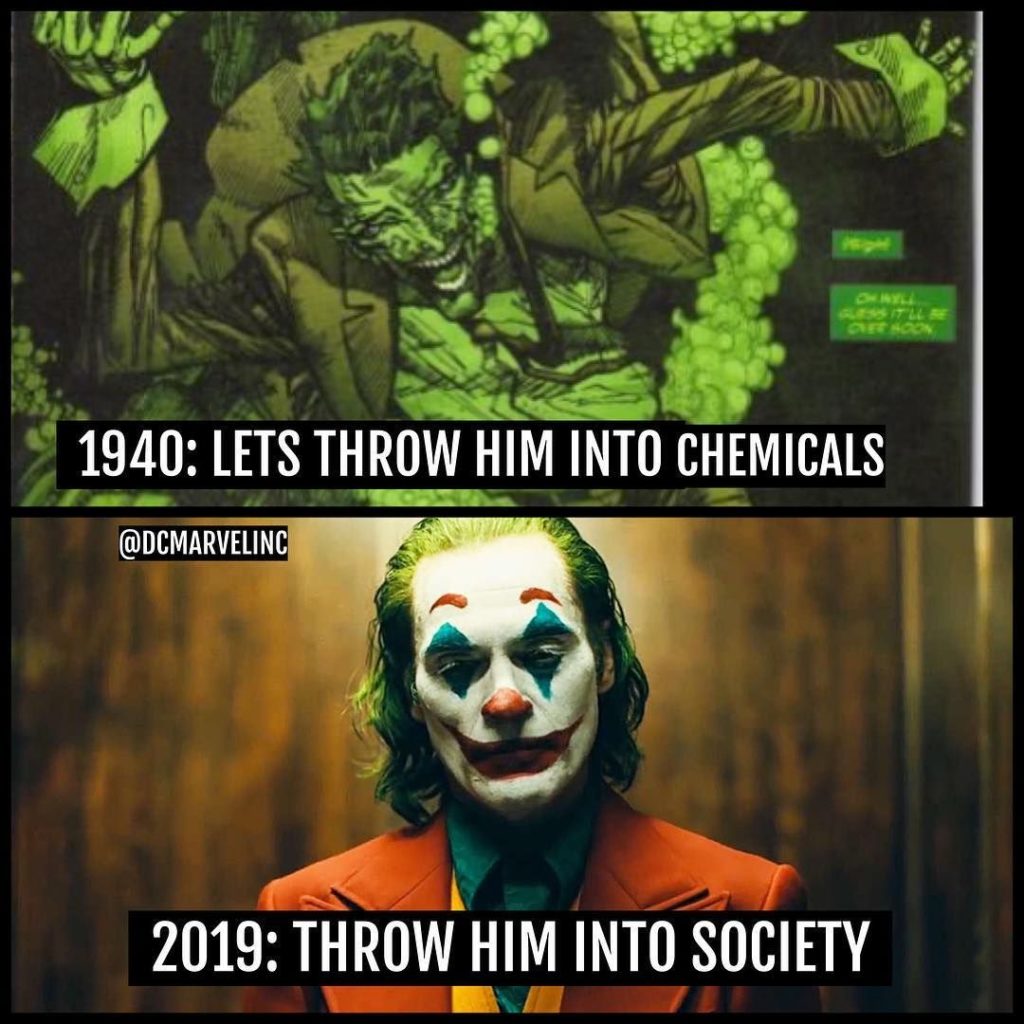
1. The original, and the best.
Just try not to read this is George Constanza's piercing voice. No one embodied the"I hate society, and society hates me" sentiment better than George, and no one ever will.
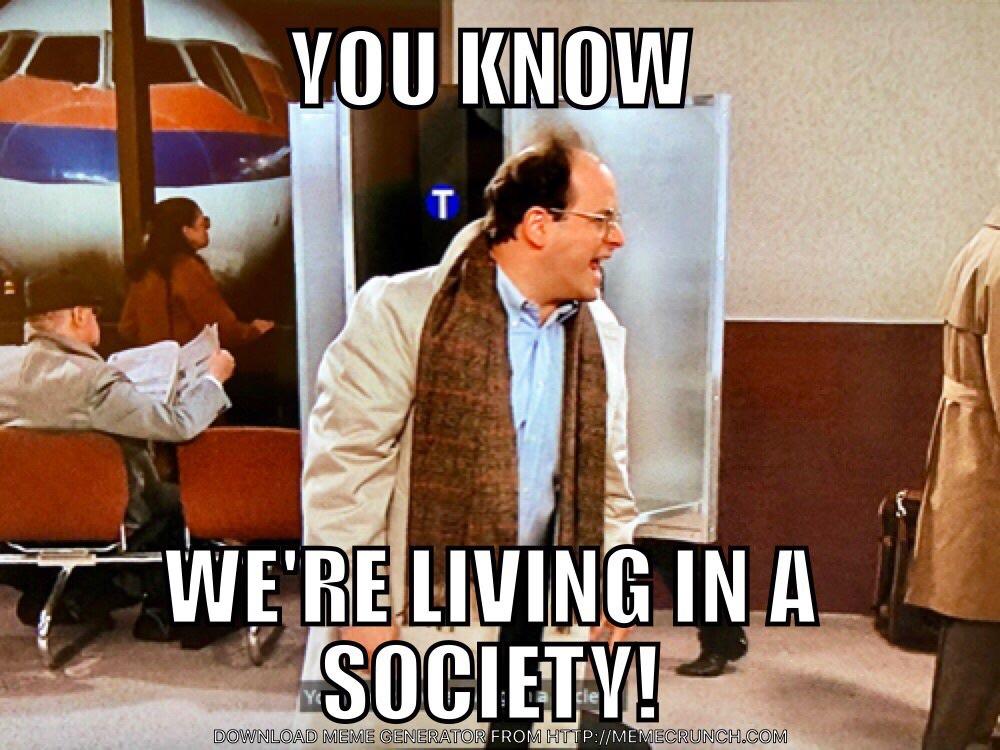
Source: https://happymag.tv/we-live-in-a-society-meme-explained/
0 Response to "I Think Its Funny We Live in an Era"
Enregistrer un commentaire